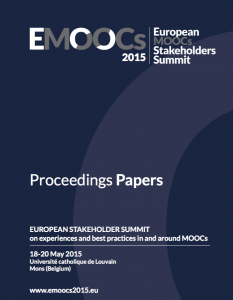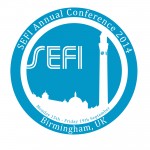Posts tagged Hennis
EMOOCs2015: Reconsidering Retention in MOOCs: the Relevance of Formal Assessment and Pedagogy
 Paper presented at the European Stakeholders summit on experiences and best practices in and around MOOCs in Mons, Belgium (18-20 May 2015).
Paper presented at the European Stakeholders summit on experiences and best practices in and around MOOCs in Mons, Belgium (18-20 May 2015).
Abstract
The motivation to enrol in a MOOC is more diverse than the motivation for a conventional course. This diversity requires re-conceptualization of the terms for enrolment, participation, and achievement. The paper addresses the concept of retention and focuses on engagement relative to assessment. Student retention is often used to determine the value of higher education. In this paper we argue that retention data about specific groups of students
can supply valuable insights to improve MOOC design and align expectations. The paper reports three short studies conducted to gain insights into disengagement from assessment, based on the data gathered in the first five DelftX MOOCs. The empirical part of the paper demonstrates that retention rates in relation to formal assessment vary from course to course. In the analysed case, fewer learners disengaged from the formal assessment in the course with highest degree of student autonomy, high learning support and scaffolds. Consistently across courses, learners who received lower grades on the first assessment task, tend to disengage from further assessment.
Reference
De Vries, P., Hennis, T., Skrypnyk, A., (2015). Reconsidering Retention in MOOCs: the Relevance of Formal Assessment and Pedagogy in Proceedings Paper EMOOCs 2015 (page 168-173): http://www.emoocs2015.eu/sites/default/files/Papers.pdf
LAK15: Scalability and Flexibility through Open Research
Abstract
Delft University of Technology (TUD) is the largest university of engineering sciences in the Netherlands. TUD has been an active member of the Open Resources Movement since 2007 and in 2012 it has joined the EdX consortium. Openness in research and education is central in the TUD mission. It was the first edX partner to issue all its MOOCs under a creative commons license. In this presentation, we present our open research approach and toolbox. This toolbox facilitates sharing of data and the process of collaborative research in the context of MOOCs/online education. The presentation explains our rationale for open research, and our experiences with the toolbox, including research highlights.
SEFI2014: Understanding social learning behaviours of xMOOC completers
 Paper presented at the SEFI Conference 2014 in Birmingham, UK.
Paper presented at the SEFI Conference 2014 in Birmingham, UK.
This paper is about the experiences with the first two MOOCs developed and executed at the Delft University of Technology (TUD) on the edX platform. The courses Solar Energy (ET3034TU) and Introduction to Water Treatment (CTB3365) have a long tradition at the TUD as regular campus courses with a good reputation worldwide. The focus of Solar Energy was on the discovery of solar energy power and the design of a complete photovoltaic system. This was done by introducing the students to the technology for the conversion of solar energy into electricity, heat and solar fuels with a main focus on electricity generation. The focus of the Water Treatment course was to learn about urban water services, including basic drinking water and wastewater treatment technologies. These two treatment chains were described as well as the physical, chemical and biological processes involved. The emphasis was on water quality and the functionality of each unit process within the treatment chain. In relation to their “MOOC”-characteristics, similarly to many other xMOOCs, these two DelftX courses had low completion rates, “knowledge-acquisition” approach to learning design, and relatively low forum activity.
Reference
De Vries, P., Hennis, T., Skrypnyk, A., (2014). Understanding social learning behaviours of xMOOC completers (paper ID 66) in Proceedings of SEFI Annual Conference 2014. ISBN: 978-2-87352-004-5
Download
Download paper Skrypnyk Hennis De Vries 2014 Understanding social learning behaviours of xMOOC completers – SEFI 2014 conference proceedings
THEMA Hoger Onderwijs 2014: Achter de schermen van moocs
Samenvatting
De TU Delft is dit academisch jaar (2013/14) begonnen met het aanbieden van massive open online courses (moocs) via edX; een open source leerplatform ontwikkeld door MIT en Harvard, waarvan intussen de TU, maar ook Stanford en een veertigtal andere universiteiten wereldwijd gebruik maken. Dit artikel gaat over de vraag wat een mooc is, waarom de TU deze aanbiedt, wat voor inspanningen het kost om zo’n mooc te maken en welke ervaringen zijn opgedaan. Voor een deel komt die kennis uit de analyse van de grote hoeveelheid data, die de vele gebruikers van zo’n mooc genereren, in dit geval twee TU-moocs, die in november 2013 zijn afgerond. Er is veel discussie en beweging rond open onderwijs en de uitkomst is nog moeilijk te voorspellen. In deze situatie is het devies van de TU ‘Learn and lead’.
Reference
Pieter de Vries, Joost Groot Kormelink, Thieme Hennis. Achter de schermen van moocs in THEMA Hoger Onderwijs 2014, nummer 1: MOOCs in het Hoger Onderwijs.
Download
Download paper from website (behind login)
